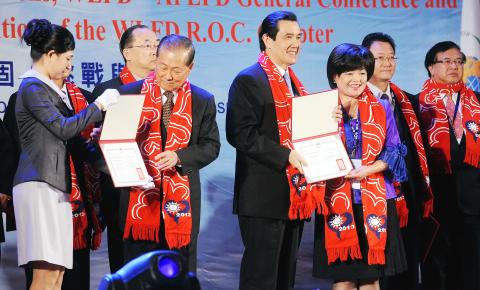President Ma Ying-jeou (馬英九) said on World Freedom Day yesterday that his administration hopes that dialogue between Taiwan and China can extend beyond economic and trade issues, to encompass human rights and the rule of law.
Taiwan’s ultimate goal is to maintain peace in East Asia and allow people on both sides of the Taiwan Strait to pursue the values of freedom and democracy, Ma said at a ceremony in Taipei marking 2013 World Freedom Day.
Ma said that since he took office in 2008, dialogue between Taiwan and China has focused on trade and cultural issues, but he expressed hope that the issues of freedom, democracy, human rights and the rule of law could be taken up in the near future.

Photo: Liu Hsin-de, Taipei Times
“Although democracy is an imported system, we have fully proved over the past 60 years that this foreign system can actually be cultivated in the soil of Chinese culture,” he said, adding that the Republic of China (ROC) has become a fully democratic country.
A sign of that, Ma said, is that Taiwan was again rated a free country in an annual report compiled by Freedom House, a Washington-based human rights advocacy group. Retaining its previous year’s rankings, Taiwan received a rating of “one” for political rights and a “two” for civil liberties, the group said in a press statement last week.
In the rankings, one represents the highest level of freedom and seven the least degree of freedom.
Ma also stressed that as a member of the international community, the ROC is determined to be a peacemaker, a provider of humanitarian aid, a promoter of cultural ties, a creator of new technologies and business opportunities, and a standard-bearer at the leading edge of Chinese culture.
“Without peace, freedom and democracy can hardly be achieved,” Ma said, adding that Taiwan and China have signed 18 agreements over the past five years, an indication of warming ties.
“I am not saying I’m happy with the ‘status quo,’ but at least both sides of the Taiwan Strait have found a peaceful solution to conflicts,” Ma said.
More than 400 guests from about 60 countries and territories attended the World Freedom Day celebrations, as well as the annual general conference of the World League for Freedom and Democracy and the Asian Pacific League for Freedom and Democracy.

Taiwan has received more than US$70 million in royalties as of the end of last year from developing the F-16V jet as countries worldwide purchase or upgrade to this popular model, government and military officials said on Saturday. Taiwan funded the development of the F-16V jet and ended up the sole investor as other countries withdrew from the program. Now the F-16V is increasingly popular and countries must pay Taiwan a percentage in royalties when they purchase new F-16V aircraft or upgrade older F-16 models. The next five years are expected to be the peak for these royalties, with Taiwan potentially earning

STAY IN YOUR LANE: As the US and Israel attack Iran, the ministry has warned China not to overstep by including Taiwanese citizens in its evacuation orders The Ministry of Foreign Affairs (MOFA) yesterday rebuked a statement by China’s embassy in Israel that it would evacuate Taiwanese holders of Chinese travel documents from Israel amid the latter’s escalating conflict with Iran. Tensions have risen across the Middle East in the wake of US and Israeli airstrikes on Iran beginning Saturday. China subsequently issued an evacuation notice for its citizens. In a news release, the Chinese embassy in Israel said holders of “Taiwan compatriot permits (台胞證)” issued to Taiwanese nationals by Chinese authorities for travel to China — could register for evacuation to Egypt. In Taipei, the ministry yesterday said Taiwan

Taiwan is awaiting official notification from the US regarding the status of the Agreement on Reciprocal Trade (ART) after the US Supreme Court ruled US President Donald Trump's global tariffs unconstitutional. Speaking to reporters before a legislative hearing today, Premier Cho Jung-tai (卓榮泰) said that Taiwan's negotiation team remains focused on ensuring that the bilateral trade deal remains intact despite the legal challenge to Trump's tariff policy. "The US has pledged to notify its trade partners once the subsequent administrative and legal processes are finalized, and that certainly includes Taiwan," Cho said when asked about opposition parties’ doubts that the ART was

If China chose to invade Taiwan tomorrow, it would only have to sever three undersea fiber-optic cable clusters to cause a data blackout, Jason Hsu (許毓仁), a senior fellow at the Hudson Institute and former Chinese Nationalist Party (KMT) legislator, told a US security panel yesterday. In a Taiwan contingency, cable disruption would be one of the earliest preinvasion actions and the signal that escalation had begun, he said, adding that Taiwan’s current cable repair capabilities are insufficient. The US-China Economic and Security Review Commission (USCC) yesterday held a hearing on US-China Competition Under the Sea, with Hsu speaking on